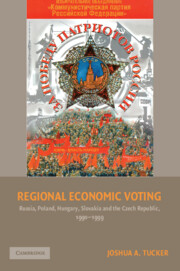Book contents
- Frontmatter
- Contents
- List of Tables
- Acknowledgments
- Party Acronyms and Candidate Abbreviations
- 1 INTRODUCTION
- 2 ECONOMIC CONDITIONS AND ELECTION RESULTS
- 3 COMPARATIVE CROSS-REGIONAL ANALYSIS
- 4 PAIRED CASE STUDIES
- 5 THE INCUMBENCY HYPOTHESIS
- 6 THE NEW REGIME HYPOTHESIS
- 7 THE OLD REGIME HYPOTHESIS
- 8 COMPARATIVE ANALYSIS
- 9 ECONOMIC VOTING AND POSTCOMMUNIST POLITICS
- Appendix I NATIONAL ELECTION RESULTS
- Appendix II REGRESSION RESULTS AND DOCUMENTATION
- Appendix III ESTIMATED DISTRIBUTIONS OF FIRST DIFFERENCES
- Appendix IV PERCENTAGE OF POSITIVE SIMULATIONS BY PARTY
- Works Cited
- Index
- Titles in the series
9 - ECONOMIC VOTING AND POSTCOMMUNIST POLITICS
Published online by Cambridge University Press: 24 November 2009
- Frontmatter
- Contents
- List of Tables
- Acknowledgments
- Party Acronyms and Candidate Abbreviations
- 1 INTRODUCTION
- 2 ECONOMIC CONDITIONS AND ELECTION RESULTS
- 3 COMPARATIVE CROSS-REGIONAL ANALYSIS
- 4 PAIRED CASE STUDIES
- 5 THE INCUMBENCY HYPOTHESIS
- 6 THE NEW REGIME HYPOTHESIS
- 7 THE OLD REGIME HYPOTHESIS
- 8 COMPARATIVE ANALYSIS
- 9 ECONOMIC VOTING AND POSTCOMMUNIST POLITICS
- Appendix I NATIONAL ELECTION RESULTS
- Appendix II REGRESSION RESULTS AND DOCUMENTATION
- Appendix III ESTIMATED DISTRIBUTIONS OF FIRST DIFFERENCES
- Appendix IV PERCENTAGE OF POSITIVE SIMULATIONS BY PARTY
- Works Cited
- Index
- Titles in the series
Summary
In this final chapter, I return to the original motivations for the study by assessing the degree to which the findings from the previous chapters can contribute both to our understanding of postcommunist politics and the more general economic voting literature. To do so, I focus in the first half of this chapter on the implications of three of the most significant findings from the study: the consistently stronger empirical support for the Transitional Identity Model than for the Referendum Model; the numerous insights added by theorizing about the conditions in which economic conditions are likely to have more or less of an effect on election results (or what I have labeled conditional economic voting hypotheses); and the apparent “stickiness” of the Transitional Identities of both New Regime and Old Regime parties, at least insofar as they pertain to regional economic voting. In the second half of the chapter, I address three related questions raised by the overall findings: the appropriate duration for testing hypotheses based on transitional circumstances; the contributions of the study to specific debates in the postcommunist politics literature; and the potential implications of regional-level findings for understanding variation in national-level election results. I conclude with some brief final observations.
Economic Voting and Empirical Support for the Transitional Identity Model
As illustrated throughout the previous chapters, the most important empirical conclusion of this book is that there is consistently stronger evidence supporting the predictions of the Transitional Identity Model than the predictions of the Referendum Model.
- Type
- Chapter
- Information
- Regional Economic VotingRussia, Poland, Hungary, Slovakia, and the Czech Republic, 1990–1999, pp. 276 - 308Publisher: Cambridge University PressPrint publication year: 2006



